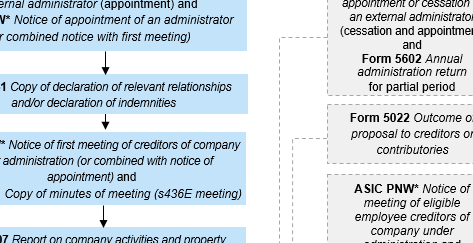Law reform
Why do we have preference recoveries in insolvency?
27/06/2021
Preferences peak indebtedness
In finding that the ‘peak indebtedness rule’ did not in fact exist, the Full Federal Court[1] in Badenoch v Bryant
Electronic delivery of documents in insolvency law
26/06/2021
electronic service OPC
Some belated concern has been raised about the potential for new corporate insolvency law allowing a winding up demand to
Licensing of insolvency practitioners – decision making principles from New Zealand [updated post 13 June 2021]
13/06/2021
Administrative law ARITA NZ RITANZ
Mr Damien Grant, the New Zealand insolvency practitioner who successfully challenged RITANZ’s decision to deny him the right to practice
Why has the Australian government not yet decided on any further insolvency law changes for small business?
12/06/2021
ASBFEO Attorney-General one year bankruptcy Treasury
Australia MSE insolvency reform process seems to have halted, perhaps because of a poor reception to its January 2021 small
Employees’ loss of FEG redundancy payments through their misguided “acts of decency and loyalty” to assist
The AAT has described its decision confirming a lack of government assistance under fair entitlements guarantee (FEG) for “two dedicated,
Service of insolvency documents by email
With law well into the process of change to accommodate electronic communications and dealings, following COVID-19 in particular, we should
Peak indebtedness and other insolvency law views from New Zealand
The decision of the Full Federal Court in Badenoch Integrated Logging v Bryant[1] agreeing with New Zealand’s view about the
Deregistered companies – UK reforms and some Australian comparisons
13/05/2021
phoenix activity deregistration
The UK Insolvency Service is to be given powers to investigate directors of companies that have been dissolved, or in
Australia’s limited insolvency reforms for small business
07/05/2021
ASBFEO MSME small business
With our international trading partners recently meeting to examine ways to handle micro to small enterprise (MSE) insolvency impacted by
An insolvency safe harbour based on culture and tradition?
04/05/2021
insolvent trading CATSI Act
For years Australia had no ‘safe harbour’ protection for directors from insolvent trading. In 2017, one was introduced, then three
What is the future of insolvency practice?
04/05/2021
artificial intelligence Rules as Code Coding Articles
The future of insolvency practice lies in artificial intelligence (AI) which this article discussed. A list of selected articles and
World Bank insolvency principles – how does Australia compare?
26/04/2021
World Bank
The World Bank has released its updated Principles for Effective Insolvency and Creditor/Debtor Regimes (the Principles), emphasising the needs of
Penalties and bankruptcy
A person in breach of consumer protection laws concerning the hire of 4 wheel drive vehicles has been ordered to
NSW registered clubs (law) in trouble, again
What are described as the “arbitrary powers of the NSW Independent Liquor & Gaming Authority (ILGA)” are the subject of
The new Attorney-General and business bankruptcies
01/04/2021
Attorney-General bankruptcy
As the new Attorney-General, Senator Michaelia Cash[1] will find her portfolio encompasses the current law reform debate about whether and
Move bankruptcy from the Attorney-General to Treasury?
23/03/2021
Attorney-General Treasury
In light of the Attorney-General’s need to transfer some matters of his responsibility, a worthy area to transfer is the
Neither a borrower nor a lender be – at least to a friend or a relative …
21/03/2021
MSME one year bankruptcy guarantees
A guarantee given by a mother to a friend of her son for the son’s business debts ended up in
Should a person be subject to restrictions after an insolvency?
21/02/2021
discharge
The default period of restriction on a person following their personal insolvency is under consideration in Australia. It prompts the
A proposed change of focus of the Australian Official Trustee in Bankruptcy
20/02/2021
Official Trustee
The Australian Official Trustee in Bankruptcy (OT) has sought comment on a significant refocus of its legal responsibilities by way
Australian personal insolvency reform for COVID-19 impacted debtors
18/01/2021
ASBFEO MSME UNCITRAL World Bank
The Australian government’s proposed retention of the restrictions of bankruptcy on COVID-19 impacted business proprietors and consumers is questionable, but
‘Modernising’ insolvency communications
The Australian government’s consultation paper – Modernising Business Communications – Improving the Technology Neutrality[1] of Treasury Portfolio Laws, of December
Australian root and branch bankruptcy reform – creditors’ rights? Elizabeth (Ist) laws? SMEs? …
While COVID-19 restrictions on creditors in bankruptcy have ended, though now with an increased $10,000 threshold, the experience should prompt
Australia’s new liquidator registration processes, and its ‘new liquidators’
On 30 December 2020, ASIC issued guidance on the new liquidator registration processes that apply in Australia two days hence
Bad bankruptcy notices
29/12/2020
bankruptcy notices Articles
A bankruptcy notice was found to have been wrongly issued by the Official Receiver because it did not attach a
Categories
Main Menu






















